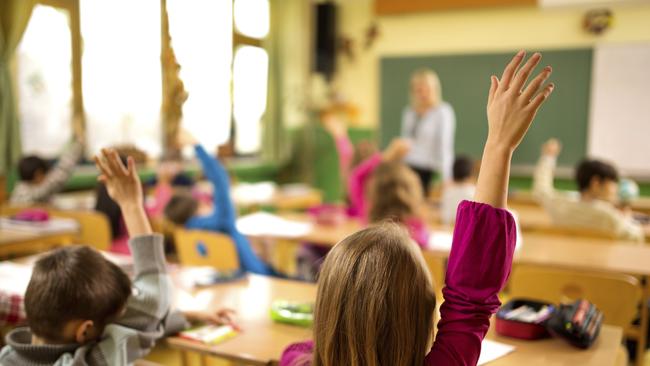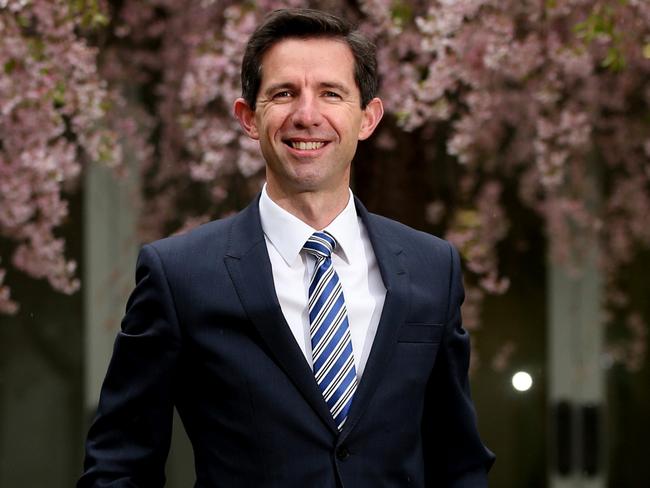Literacy and numeracy put to the test as Aussie kids fall behind
FEDERAL Education Minister Simon Birmingham has had enough - and will today set up a new advisory panel tasked with developing literacy and numeracy exams for all six-year-olds.

News
Don't miss out on the headlines from News. Followed categories will be added to My News.
PHONICS teaching in primary schools will be put under the spotlight as part of a Federal Government plan to get back to basics in the classroom and target kids who are starting school behind the pack.
Education Minister Simon Birmingham will today announce plans to begin work on a compulsory literacy and numeracy screening check for all Australian six-year-olds, as the first step in a plan to identify weaknesses in the way basic literacy skills are taught in the early years of school.
The reform, which is being fast-tracked after dismal global literacy and numeracy tests saw Australian children surpassed by kids in countries such as Kazakhstan, is expected to lead to a shake-up in phonics teaching.

University teaching degrees, which are failing to equip graduates with the skills to properly teach children the building blocks of reading, are also expected to come under scrutiny.
The phonics and numeracy test, first flagged in last year’s Budget, will be linked to the Future Schools funding deal but, as funding negotiations drag on, Senator Birmingham has declared work on the phonics test cannot wait.
“There is an urgent need to stop so many children falling through the cracks in Australian classrooms, especially with the foundation skill of reading,” Senator Birmingham told The Sunday Telegraph.
“Australia’s education performance in recent national and international reports has raised a red flag, for both policymakers and parents, that requires action now.”
Senator Birmingham will today announce the appointment of six maths and phonics experts to a new advisory panel tasked with developing the literacy and numeracy assessment.
The panel will include Dyslexia-SPELD Foundation chief executive Mandy Nayton, head of La Trobe Rural Health School Pamela Snow, and Australian Mathematical Sciences Institute director Geoff Prince.
Senator Birmingham said the Federal Government would act on the changes the group of experts recommend.
Professor Snow has already flagged the need for better university training for future teachers in phonics.
“Teachers don’t have very well developed knowledge about how language works, about the basic linguistic rules, of phonology, morphology and syntax,” she said.
“If students are not performing as well as they should (in the literacy check), we need to be lifting the lid on the black box of pre-service teaching practice.”
Queensland Education Minister Kate Jones criticised the announcement, saying parents across the states knew phonics was taught from Prep to Year 2.
“This is a big C for crock: cr-o-ck, crock!” Ms Jones said.
“Senator Birmingham has again failed to do his homework.”
Education myths dispelled
Myth 1: Smaller class sizes increase learning for all students.
Teaching quality is more important. Size only matters if classes are reduced to under 10 students.
Myth 2: Grouping kids by academic ability benefits all learners.
This benefits high achievers but is detrimental to mid-range and lower- performing students.
Myth 3: Homework improves learning and achievement.
One or two hours a day of focused homework is beneficial in secondary school. For primary kids, it is more effective to set home activities involving parents in what kids are learning at school.
Myth 4: Kids benefit more from praise than criticism.
Just giving praise for effort can be ineffective, or even negative, as it doesn’t help the learner improve.
Myth 5: Struggling students should repeat a year.
Staying down a year has a negative impact on learning, as well as being very costly. Individual support and peer tutoring work much better.
Myth 6: Extracurricular outdoor activities improve students’ academic performance.
This is only partially true: students who participate in wilderness-based outdoor adventure learning for more than a week appear to benefit, but it’s not clear exactly why.
Myth 7: Motivating students to aim high increases their performance.
Just raising aspirations has little to no positive impact – possibly because kids really need more skills, better teaching or more parental support.
Myth 8: A good physical environment improves academic achievement.
Schools need orderly, comfortable settings. There’s no evidence supporting fancy buildings or campuses.
Originally published as Literacy and numeracy put to the test as Aussie kids fall behind


